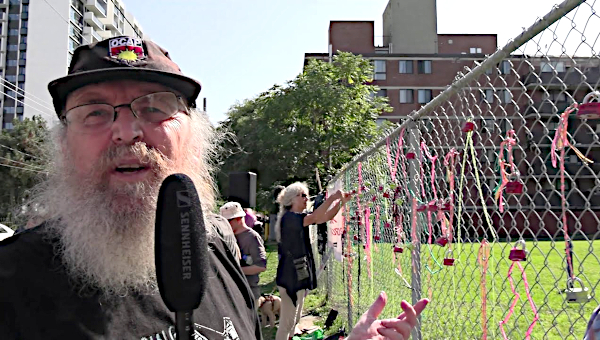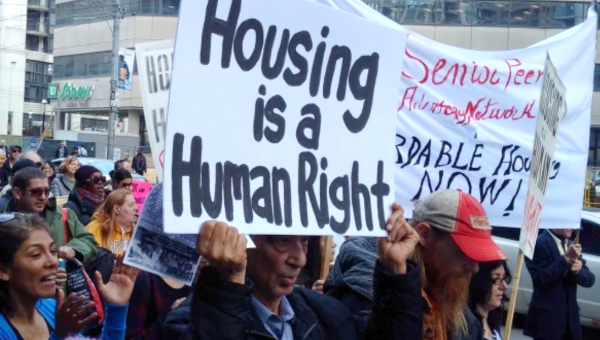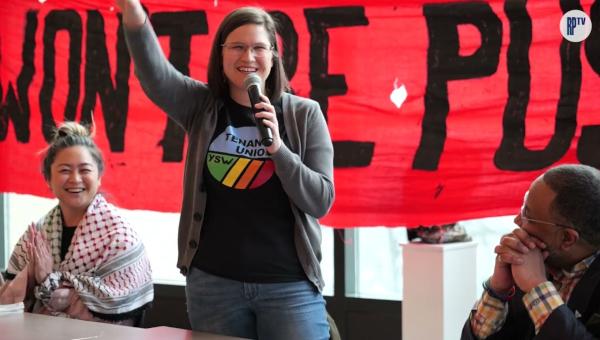November 5 Day of Action Called at Critical Time
The November 5 day of action for a ‘poverty free Ontario,’ that has been called by the Canadian Federation of Students (CFS), is taking place against a backdrop of major attacks on working class living standards and social gains. The day needs to become a rallying call for a serious resistance to these unfolding attempts to impose the burden of the economic crisis of capitalism on workers and the poor.

In calling this action, the CFS has raised the issue of the massive tuition costs that are faced by students and, very correctly, presented this debt burden as a factor that fuels poverty. They have also, however, chosen to go beyond the issues of their membership and have welcomed union and community participation, giving these allies an opportunity to present their grievances and demands as part of the overall mobilization.
The Ontario Coalition Against Poverty (OCAP), joined by other community organizations, will be marching through Toronto’s financial district on November 5. We will target the very capitalist institutions that have been bailed out at public expense and on whose behalf governments will now launch a massive round of austerity. Our March will advance demands for measures that poor communities will need to survive both economic downturn and ‘jobless recovery.’ We’ll be demanding decent jobs, income and housing. We’ll call for status for all immigrants and refugees and justice for First Nations people. Most of all, however, we will deliver a call to unions and community organizations to reject concessions and cutbacks and to fight any and all attempts to impose the burden of the crisis on working people.
A very short while ago, as this crisis took hold and major capitalist institutions began to fall apart, a decades long obsession with public debt and government deficits was instantly set aside. Literally trillions of dollars were suddenly made available to try and jumpstart the faltering system. A limited and fragile stability has now been created but we need to understand that the implications of this ‘recovery’ are dangerous in the extreme. Even prior to the financial collapse, Ontario’s industrial base was being eaten away. Last week’s decision by Ford to close its plant near St. Thomas, at the cost of thousands more jobs, is a reminder that the corporations will recover at our expense by rationalizing their operations, discarding a section of their workforce and trying to force major concessions out of those who remain. Even in their calculated optimism, economists and politicians acknowledge that high levels of unemployment will be a feature of the next period.
Triangulation of Forces
While the Federal Finance Minister talks of the ‘painful decisions’ that lie ahead, his Ontario counterpart begins to formulate his government’s plans for social cutbacks. Not to be left out, Toronto city politicians have started to look for the departmental cuts that, they assert, are being forced upon them by rising welfare costs. If we are to come out on the streets and call for a poverty free Ontario on November 5, we need to understand that the intention of governments is to move in the opposite direction and that it falls to our movements to develop a clear plan to fight for the goals we advance.
Even if the present crisis had never occurred, it would have been necessary to acknowledge that the Dalton McGuinty Government in Ontario has no intention of reversing the impact that the agenda of the Mike Harris Tories had on the poor. Well into the Liberal’s second mandate, welfare rates were lower, in terms of spending power, than they had been under the Tories. Key indicators like food bank use and the number of evictions taking place made it very obvious that nothing was improving. Their reluctant measures on the minimum wage and their gestures on income support, offered very little justification for a failure on the part of unions and social movements to mobilize against them. Now that the illusion of ‘poverty reduction’ gives over the reality of impending austerity measures, it is time to replace ‘constructive engagement’ with the Liberals with social mobilization against them.
November 5 will fall sadly short if it appeals to the supposed conscience of the Government instead of calling for resistance to those in power. It will not meet its potential if it fails to identify the attacks that are coming down on us as an attempt to stabilize a system in crisis at our expense. More than anything, the day must be about building a movement of serious and effective resistance to these same attacks.
Over the last months, we have watched union members pressured to take concessions and, very frequently, union leaders accepting the logic of austerity. We have seen the attack go over from the private sector to the public and seen municipal workers and Windsor and Toronto forced to defend their gains with long strikes. We may now anticipate a wave of social cutbacks in Ontario that may well exceed the severity of the measures imposed by the Common Sense Revolution of the Harris Tories. Stopping this attack will require a movement with a very particular orientation and a strategy that flows from it.
If we are up against an attempt to solve the crisis by reversing workers’ gains and worsening the depth and scale of poverty, then, for our movements, anti capitalism is a very practical question. When union leaders broker concessions, they act to preserve the profitability of the corporation that has put a gun to the workers’ heads. When social action against government cuts is limited to a process of sedate lobbying, those directing it have accepted the myth that governments are honest brokers that hear from different sectors of the population and try and act for the common good. If, however, we don’t accept that the best we can hope for is what can be reconciled with the interests of banks and corporations, we have a lot more room to move. We can reject concessions blackmail and challenge plant closures. We can oppose social cutbacks with forms of action that are sufficiently disruptive that they impose both political and economic costs on a regressive agenda that a government may not be willing or able to meet. We can even start to provide our movements with the sense that they are fighting for a society that is fundamentally better than the one that we now live in.
Who Pays?

From the above, it will be clear that the decision of OCAP to contribute to the November 5 day of action with a march through the financial district was not made randomly. If there is a crisis of capitalism, the question that is posed is who will pay for it? Corporations will use the crisis to impose concessions and further weaken unions. Governments will now massively accelerate the considerable degree to which social programs have already been gutted. Public debt, which is of no consequence when it is time to drop bombs or bail out banks, will be once again presented as an ultimate threat to be wiped out at all costs. The right to decent jobs or adequate income, to housing, to health care, to decent and accessible education conflict with the stability and profitability of this system and will be attacked accordingly.
In this situation, if we are to fight back effectively, it is vital that we work to change the orientation of the broad working class movement. We have to organize in our unions and community organizations and fight for a change of direction. We can’t win if we won’t fight back and we can’t fight back if we are not ready to challenge the system that engenders the attacks we face. We must develop demands that are based on our needs and not on the requirements of capitalism. We must stop registering our protests against that which we accept as inevitable and start fighting with the intention of winning. If November 5, poses such a possibility and points in such a direction, it will be a day of very great importance. •
Resources:
- CFS: Drop Fees
- OCAP: All Out November 5th – 1:30pm, St. James Park (King St. East and Jarvis St.)
Events across the province:
- Guelph: 1:00pm – St. George’s Square
- Ottawa: 11:00am – Morisset Library Terrace at the University of Ottawa
- Toronto: 2:00pm – Convocation Hall, The University of Toronto; 4:00pm, Queen’s Park
- Windsor: 10:00am – CAW Student Centre
- Complete list of events
View it on Blip.TV website

“Capitalism is Broken” – financial district in Toronto, November 5, 2009.





